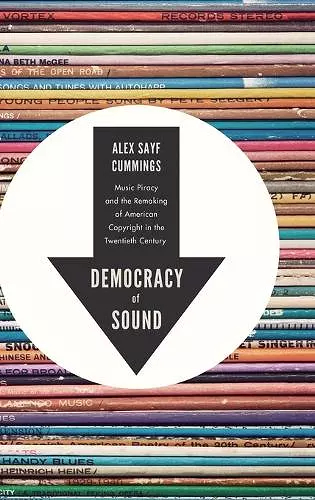Democracy of Sound
Music Piracy and the Remaking of American Copyright in the Twentieth Century
Format:Hardback
Publisher:Oxford University Press Inc
Published:25th Apr '13
Currently unavailable, and unfortunately no date known when it will be back
This hardback is available in another edition too:
- Paperback£31.99(9780190675110)

Democracy of Sound is the first book to examine music piracy in the United States from the dawn of sound recording to the rise of Napster and online file-sharing. It asks why Americans stopped thinking of copyright as a monopoly-a kind of necessary evil-and came to see intellectual property as sacrosanct and necessary for the prosperity of an "information economy." Recordings only became eligible for federal copyright in 1972, following years of struggle between pirates, musicians, songwriters, broadcasters, and record companies over the right to own sound. Beginning in the 1890s, the book follows the competing visions of Americans who proposed ways to keep obscure and noncommercial music in circulation, preserve out-of-print recordings from extinction, or simply make records more freely and cheaply available. Genteel jazz collectors swapped and copied rare records in the 1930s; radicals pitched piracy as a mortal threat to capitalism in the 1960s, while hip-hop DJs from the 1970s onwards reused and transformed sounds to create a freer and less regulated market for mixtapes. Each challenged the idea that sound could be owned by anyone. The conflict led to the contemporary stalemate between those who believe that "information wants to be free" and those who insist that economic prosperity depends on protecting intellectual property. The saga of piracy also shows how the dubbers, bootleggers, and tape traders forged new social networks that ultimately gave rise to the social media of the twenty first century. Democracy of Sound is a colorful story of people making law, resisting law, and imagining how law might shape the future of music, from the Victrola and pianola to iTunes and BitTorrent.
a jolly good read ... captivating ... packed with excellent historical research that charts music piracy as far back as 1877 * Ursula Smartt, Entertainment Law Review *
Cummings makes a quiet case for moving towards a less repressive intellectual property regime in the Creative Commons vein. But he's not an ideologue, and the his main contribution is not to propose a particular legislative path for copyright. Rather the book is valuable because it shows how long, and how thoroughly, the history of recorded music has been the history of "pirated" music ... Whatever rules are established, Cummings' book makes clear that piracy will continueand that that is far from being a bad thing. Certainly, some copiers are rip-off artists. But others are fans, or even creators. * Noah Berlatsky, Reason *
ISBN: 9780199858224
Dimensions: 155mm x 239mm x 28mm
Weight: 499g
272 pages